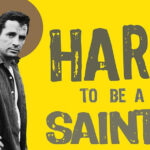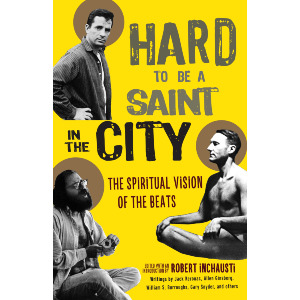We have excerpted part of the chapter “Meditation Looks Inward, Poetry Holds Forth: Is There a Beat Way of Writing?” from Hard to Be a Saint in the City: The Spiritual Vision of the Beats here.
In this book, Robert Inchausti explores the Beat canon to reveal that the movement was at its heart a spiritual one. It goes deeper than the Buddhism with which many of the key figures became identified. It’s about their shared perception of an existence in which the Divine reveals itself in the ordinary. Theirs is a spirituality where real life triumphs over airy ideals and personal authenticity becomes both the content and the vehicle for a kind of refurbished American Transcendentalism.
To order the full book, click here.
Beat writing, like other forms of contemplative practice, is a form of autopoesis (or self-making). It liberates both readers and writers from their enthrallment to the prevailing cultural trance, so as to free the pent-up personal energies of their organisms, thereby advancing their individual survival capacities and those of the species.
Jack Kerouac
I believe that there is a general movement at this very moment among the great hidden honest writers living in the world today, some of them bearded saints, one of them that old Spanish Reichian eccentric who lived in the California woods and wrote the legends of the Pomos and other Indians in his own hip crazy way, but he is only one of many, a movement of men who in the 19th century would have been great novelists but are now so bared down to the bony truth that fiction can only be fiction to them from this moment onward, who know that the modern world can only be expressed in great straight statements made on the spot almost like Christ speaking from the Cross as the winds rise and just as crucial & fatal as that, men who have come to learn that there is nothing more amazing, instructive, filled with soul-saving love or apocalyptic and world-making than what actually happens anywhere at any moment, and soon, (as Whitman knew). I say this movement is growing the more so as cheap novels ease on bookstands and quite naturally. But I’m not concerned with reforms, only my love life.
Allen Ginsberg
Kerouac’s motive for his probe was disillusionment: the heavy experience of the lives, old age, sickness and death of his father and his older brother, whose dying he experienced as he took care of them and watched them in their beds, close to their deaths. As he wrote in Visions of Cody, in 1951:
I’m writing this book because we’re all going to die—in the loneliness of my life, my father dead, my brother dead, my mother far away, my sister and wife far away, nothing here but my own tragic hands . . . that are now left to guide and disappear their own way into the common dark of all our death, sleeping in me raw bed, alone and stupid: with just this one pride and consolation: my heart broke in the general despair and opened up inwards to the Lord, I made a supplication in this dream.
As a motive for writing a giant novel, this passage from Visions of Cody is a terrific stroke of awareness and bodhisattva heart, or outgoingness of heart. So I’m speaking about the ground of poetry and purification of motive.
Michael McClure
My poetry is to make myself conscious. And my poetry is to illuminate a reader, if he or she is interested, with what I’ve been able to do with my consciousness, which may be of use to them on their own. Perhaps my poetry is to broaden my sensorium, and hopefully it will broaden the sensoriums of other individuals who read it. In other words, the function of poetry, as I see it, is to create a myriad-mindedness. I see myself wholly as an artist, as a poet. I am not a utopian. I’m not a socio-biological thinker. But I do align myself with a movement or a thread or a stream or a surge of individuals who are interested in liberation of the body, in the liberation of the imagination and the liberation of consciousness. In that sense, we may be of help to those who begin to deal with the situations that need to be dealt with. I constantly ask biologists, botanists, or bio-philosophers what we may do, what we may think about, what the situation is. That’s reflected in my poetry. I’m an artist.
Gary Snyder
How do you prepare your mind to become a singer? It takes an attitude of openness, inwardness, gratitude; plus meditation, fasting, a little suffering, some rupturing of the day-to-day ties with the social fabric. I quote from the Papago (or more properly, O’od-ham):
A man who desires song did not put his mind on words and tunes. He put it on pleasing the supernaturals. He must be a good hunter or a good warrior. Perhaps they would like his ways. And one day in natural sleep he would hear singing. He hears a song and he knows it is the hawk singing to him of the great white birds that fly in from the ocean. Perhaps the clouds sing or the wind or the feathery red rain spider on its invisible rope. The reward of heroism is not personal glory nor riches. The reward is dreams. One who performs acts of heroism puts himself in contact with the supernatural. After that, and not before, he fasts and waits for a vision. The Papago holds to the belief that visions do not come to the unworthy, but to the worthy man who shows himself humble there comes a dream and the dream always contains a song.
William Everson
There is a difference between an authentic artist and the pseudos. There is the pseudo artist who is a man not willing to carry his art to the point where the art drops away and a superior principle subsumes it. To be able to do that heroically; to be able to carry your art to that point and then to be able to cancel it out, and know your search is for that life beyond art—this is the thing that makes an artist great.


